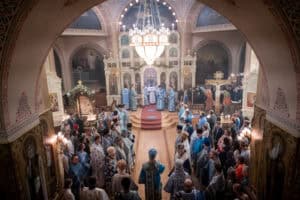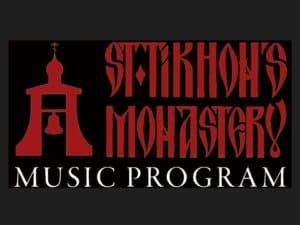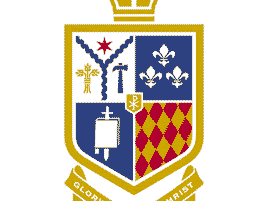BURBANK,IL [DOM Communications] – On Wednesday, September 1, 2021, Archpriest Sergei Glagolev reposed in the Lord at the venerable age of 93. Fr. Sergei, who is most noted for his work in liturgical music, was also a beloved pastor. The following was shared with DOMOCA.ORG by Archpriest John Memorich, Rector of Archangel Michael Orthodox Church in Broadview Heights, OH.
During the Twelfth All-American Council (Sobor) held in Pittsburgh, July 25-30, 1999, Archpriest Sergei Glagolev asked His Beatitude if he could address the brother clergy at a special clergy breakfast following liturgy. At the time, Fr. Sergei didn’t know that God would continue to bless him with so many years after, but he felt like this might be his last hurrah and he wished to make some final remarks to cherished friends and brothers, as well as words of encouragement to those just beginning the priestly ranks.
Fr. Sergei gave a most inspiring talk that focused on Love: Christian Love, Christ-like Love that all clergy must demonstrate within their pastorate. It was a stellar speech and one of those moments where not only did everyone listen in spiritual, spell-bound silence, but was delivered almost like a sacrament unto the hearers, words of love.
Later that day I asked Fr. Sergei if I could have a copy of his speech, which he gratefully gave me – with all of its corrected spelling, notations, and additions.
Here is that speech, a true epistle of love:
Archpriest John Memorich
All American Council -XII July 30, 1999
Archpriest Sergei Glagolev
Your Beatitude, most respected Archpastors and Bishops, beloved pastors and brothers in Christ: Christ is in our midst!
How good it is on this last day of the last All-American Council of this millennium for us to come together as the brotherhood of archpastors and pastors, to break bread together in “agape” – the meal of love – the logical extension of the Holy Eucharist we have celebrated together “in behalf of all and for all.” And may the Council end today with the warm brotherly embrace of one another – having been enabled by the Spirit’s grace not simply to know “about” each other, but to know each other more profoundly, perhaps even deeply enough to care.
Yet love – more especially Christian brotherly love – is always a risky business. Love (and this “knowing each other” is akin to love) makes us vulnerable. Love leads us to the Cross. There is no other way to pastor, let alone live the Christian life.
Many years ago, the late Archbishop John of San Francisco sent me as Chancellor of the Western States to confirm on his behalf a young priest as parish pastor. I could see that the parishioners seemed to like the young man, and so I was emboldened to ask one of the men on the Parish Council how the priest was doing during his first year in the parish. The man sighed and said, “Oh, he’s alright, I guess, but all he ever talks about is love.” What else is there to talk about, I remember thinking, God the Father having delivered us from the power of darkness and conveyed us into the Kingdom of the Son of His Love (Col. 1:13). “Owe no one anything except to love one another; for he who loves another has fulfilled the law…love does no harm to a neighbor; therefore love is the fulfillment of the law” (Rom 13:8,10).
But I knew where that parishioner was coming from: all that talk about “knowing each other, loving one another,” made him feel vulnerable. Why not talk about the “rules” – surely, that feels more “religious:” what makes us more “Orthodox,” – the rules, you know: when to stand, sit, kneel and cross yourself, what not to eat and when, what text to use, what not to omit, how to dress, for whom you can or cannot pray – you know, the rules.
I invited the same Archbishop John to address the San Francisco Cathedral Sisterhood during one Great Fast – it was his Cathedral, and he knew the women well. He spoke for more than an hour about the meaning of Christian fasting. At the end, a cathedral lady stood up and protested, “But, your Eminence, you have not told us what we can or cannot eat!” With a deep sigh – and yet with a twinkle in his eye, the Archbishop answered, “Dear ladies, don’t eat each other.” [At this point the clergy all laughed loudly and Fr. Sergei said off the cuff, “It’s true, it really happened; you can’t make things like this up.”] “Above all things,” St. Peter says to the newly baptized in Christ, “have fervent love for one another, for love covers a multitude of sins” (I Peter 4:8).
I remember reading for the first time the story of the Grand Inquisitor, in Dostoyevsky’s Brothers Karamazov while still in seminary in the 1940’s. You remember how furious the old Cardinal was over our Lord Jesus appearing in his city and upsetting his rule of law and order with all that sweet talk about beauty, love, and forgiveness. Our Lord answered his accuser’s tirade with the kiss of peace. In the end, it is not “heresy-cleansing,” but beauty that will save the universe. Christ is the Light, and in the beauty of His Light shall we see light.
We are pastors because we are called to be “people-persons.” Surely, we love liturgy as life, for in worship we are called into the very glory of Christ’s presence. But liturgy and life is also a relationship: to the Holy Trinity, to the Theotokos and all the angels and saints, and not least, a relationship to each other, to those who worship with us and those who do not, those within and without liturgy and life. Having offered up the whole cosmos as an act of love in Christ “in behalf of all and for all,” and having called to mind each and all, the faithful respond, “and all mankind!” Here we have to be mindful: I remember years ago how Charlie Brown so succinctly paraphrased a Dostoyevskian phrase: having had enough of Lucy, he cries out, “I love all mankind, it’s people I can’t stand!” It’s easy to love the presbyterium, the Brotherhood; it’s the “brother” who’s hard to take.
I read recently an excerpt from St. John Chrysostom’s Johanine commentary on Our Lord’s restoration and commission of St. Peter (John 21). “Simon, son of Jonah, do you love Me?” – our Lord asks St. Peter thrice (thereby absolving the three-times denial). “Yes, Lord, You know that I love You,” St. Peter replies thrice. “Then feed My Lambs. Tend My Sheep. Feed My Sheep.” Of course, Jesus knows Peter loves Him. Chrysostom says Our Lord here speaks of His own love for each and every member of His Precious Body the Church – and those who are yet to come, as well as those who are yet to turn away from their denial – for all, in behalf of all. Our Lord is saying to St. Peter – and thus to all who pastor: Love Me – love My Sheep. Love Me – feed My Lambs. Love Me – tend to My Sheep. Love Me – feed My Sheep. If you love Me, you must love them with My love.
Returning from the reconstruction of St. Catherine’s Church of the Orthodox Church in America’s Representation in Moscow last month, our delegation stopped briefly in Helsinki for a visit with Metropolitan Leo and the vibrant Orthodox Church of Finland. The Finnish Orthodox woman who was guiding us on the Metropolitan’s behalf was giving us some insights into Finnish character. She remarked that Finnish representatives who are sent to Western Europe and North America have to take special courses in small talk and pleasantries because trivial conversation is not part of Finnish national culture. She demonstrated with an anecdote about a Finnish couple who was married for 48 years. One evening the wife burst into tears and could not be comforted. After much prodding by her bewildered husband, she blurted out that on their wedding day, he told her that he loved her, but has never said he loved her ever since. “Darling,” said the husband, “if I ever change my mind, I’ll tell you.”
As you know, St. Herman, our first North American Saint, was from Valaamo in Finland (thus he was probably a man of few words). Yet you see how in Christ he adapted to the needs of his Native American people. For the cover of the Akathist of the Canonization of St. Herman of Alaska in 1970, Fr. Vladimir Borichevsky chose a drawing of St. Herman giving cookies he baked to delighted Aleut children. In Christ, he found ways to tell his new American family that he loved them. He showed them that he loved them. Of course, you know that no matter what we do, somebody is going to criticize. Fr. Borichevsky was lambasted. Of all the writings we have about St. Herman, surely baking and giving cookies to delight children hardly depicts the sanctity of the man! It doesn’t? The critic completely missed the point, didn’t he. Didn’t he?
Please, dear brothers, don’t wait any longer to tell the flock Christ has entrusted to you, that you love them. Show them that you love them. And when they stray, gather them together, and bring them back to Christ. “Simon, son of Jonah, do you love Me? Then tend to My Sheep.”
I am an old man, and our Lord may not give me another chance to speak to you. Later, when people might ask what I had to say, tell them that all I ever talked about was love.
God bless you each and every one.
Pray for me, a sinner.
Thank you for your patience.




